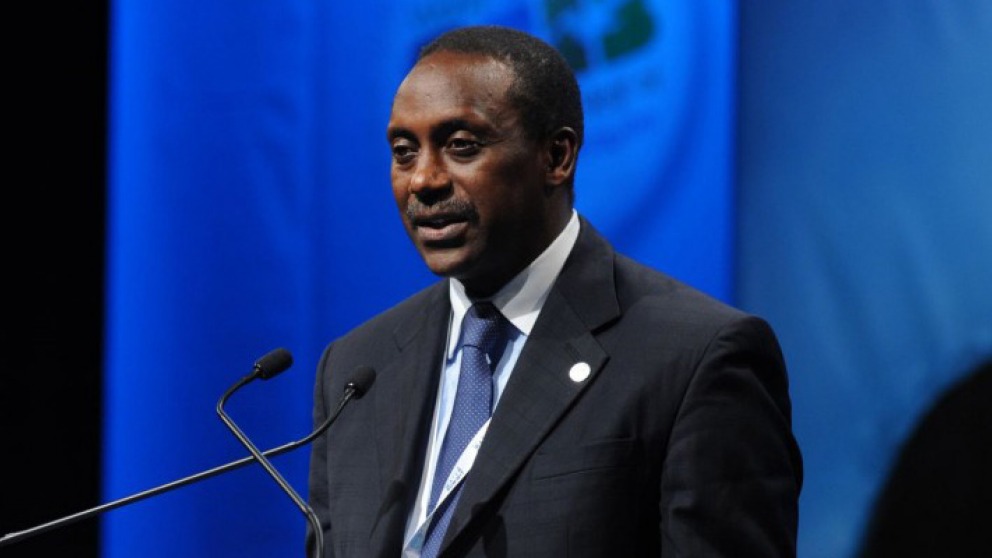Headline:
Q&A: Kandeh Yumkella on Sustainable Energy and Societal Prosperity

As UN Secretary-General Ban Ki-moon’s Special Envoy für Sustainable Energy for All (SE4All), Kandeh Yumkella has taken on the mammoth task of providing everybody on the planet with access to an environmentally friendly and secure energy supply. In the course of our meeting at the IASS-SE4All Forum on the global dimension of the German energy transition, I took the opportunity to ask him three questions that preoccupy us in the IASS Transdisciplinary Panel on Energy Change:
How can developing countries benefit from the energy transition in Germany?
Germany is showing global leadership by taking bold steps towards an unprecedented structural transformation of its entire energy sector. This switch towards renewable energy sources and increased efficiency will demonstrate to the world that no matter how big the economy, it can be run in a much more environmentally friendly and sustainable way than in the past. Both developed and developing countries need no longer be dependent on dirty energy to fuel the growth of their economies.
The transition Germany is undertaking generates innovative technologies that improve and optimise the generation of sustainable energy, its transmission, distribution, storage, and usage. For developing countries to be able to follow the German example, these technological innovations need to be made available to them. It is important to understand that when it comes to ensuring the continued viability of our planet – for both rich and poor – we cannot afford to be exclusive. Nothing should stand in the way of the effective dissemination of environmentally friendly technology.
What can Germany learn from energy transitions elsewhere?
Energy transitions are normally defined as a shift to sustainable development through the use of renewable energy and measures for increased energy efficiency. Energy conservation and improvements in energy efficiency play a major role.
There are many interesting examples of expertise in these areas that Germany can learn from. They include onshore and offshore wind power and tidal power in the United Kingdom, geothermal know-how in Iceland and hydropower in Austria, where the town of Güssing has made itself independent and sustainable in its energy production. Denmark covers 41% of its domestic electricity consumption with renewable energy and has expertise in sustainable heating for buildings. Switzerland has built Alpine storage power plants that supplement generation at run-of-river power plants. These are just a few examples of countries that are increasingly taking the lead in shifting the energy focus from fossil fuels to renewable sources.
In a broader sense, energy transitions are about the ‘democratisation’ of energy, and they depend on the maturity of markets and consumer choices. Developments towards energy transitions in developing countries and emerging economies will be closely watched, and will provide an array of business opportunities for countries that already have the expertise and technologies to scale.
How does the decarbonisation of our energy systems go hand in hand with societal prosperity?
Let me give you two concrete examples that are directly relevant to my own continent, Africa: providing clean cookstoves and ending gas flaring.
Around 3 billion people around the world still cook and heat their homes using solid fuels – wood, crop waste, charcoal, coal and dung – in open fires and leaky stoves. The World Health Organization estimates that 4.3 million people, mainly women and children, die prematurely every year from illnesses caused by household air pollution due to the inefficient use of these solid fuels, and it is the poorest who suffer most. In poorly ventilated dwellings, the levels of hazardous small particles in indoor smoke can be some 100 times higher than acceptable standards. Exposure is particularly high among women and young children. By protecting women's and children's health, access to clean and efficient cookstoves increases the overall wellbeing of society. It also reduces women’s workload and helps to unleash their productive power.
Another example is gas flaring at oil and gas production sites. Vast amounts of gas associated with the extraction of crude oil are commonly flared as waste or unusable gas, partly because of the lack of pipelines and other gas transportation infrastructure, and partly because of a lack of paying consumers. If we can stop gas flaring worldwide and distribute the gas via a grid system to areas without energy access, we will not only contribute tremendously to the reduction of carbon emissions, but also tap into a new source of energy for energy-poor communities, thereby providing far-reaching benefits for society.
Photo: SE4All

Add new comment